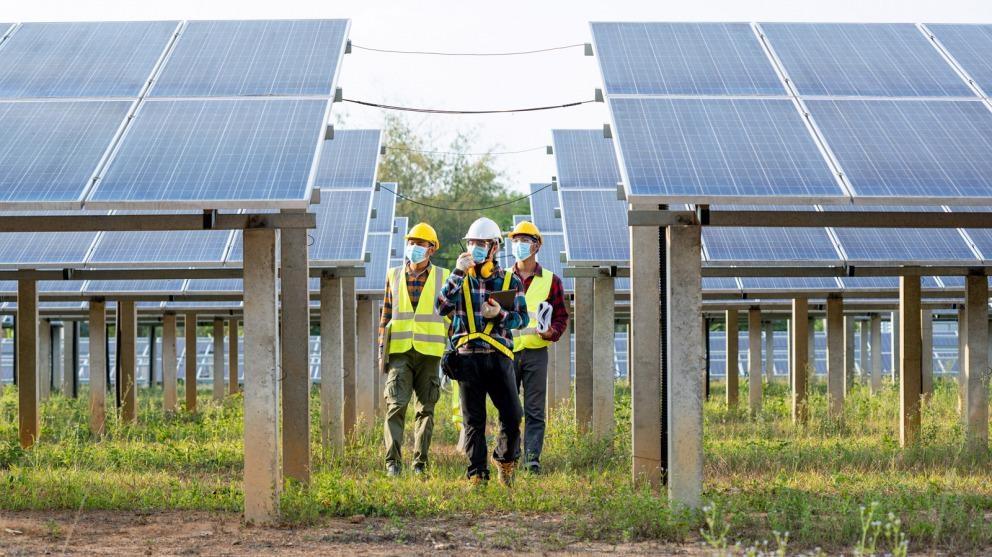Mar 24 2021
The partition present between the energy transition frontrunners and laggards is getting deeper due to the COVID-19 crisis. In a new study, scientists from the Institute for Advanced Sustainability Studies (IASS) in Potsdam offer an outline of the universal effect of the coronavirus pandemic on the energy sector.
 The coronavirus crisis is hampering investment in renewable energy, especially in middle- and low-income countries. Image Credit: Shutterstock/M2020.
The coronavirus crisis is hampering investment in renewable energy, especially in middle- and low-income countries. Image Credit: Shutterstock/M2020.
The study results illustrate that low- and middle-income countries would require more support in their measures to dump fossil fuels.
The COVID-19 crisis will intensify the present disparity in an irregular energy transition landscape. In spite of the crisis, frontrunners in the worldwide energy transition will keep expanding their renewable energy capacities, while laggards will fall behind even more.
In Europe, the Green Deal has an impact and has even promoted Poland to expedite its incipient energy transition. By contrast, in low- and middle-income countries, the pandemic is aggravating funding problems and affecting investment in renewable energy infrastructure.
This is especially obvious in Latin America, where all the auctioning activity in the renewable power sector has been stopped. In several G20 countries, pandemic-related financial assistance for fossil fuel industries has hindered measures to endorse renewable energies.
The Crisis has Deepened the Reliance on Fossil Fuels
As far as the countries whose economies are strongly dependent on fossil fuels are concerned, governments have promised considerable support to such sectors, further strengthening present dependencies.
For instance, in Indonesia, the government has selected to assist its coal industry with tax breaks and by decreasing regulatory needs, while plans to substitute older, fossil-fueled power plants with renewable energy solutions have been reduced.
But help for the fossil energy sector does not always go together with a deceleration in the transition to clean energy.
In some large countries, our observations suggest contradictory trends. The USA and Canada, both major oil and gas exporters, were hit hard by the collapse in demand, with the governments of both countries pledging to support the fossil sector. However, it seems unlikely that this will slow the growth of renewables in these countries for the time being, as energy transition pioneers like California continue to move away from fossil fuels.
Rainer Quitzow, Study Lead Author, Institute for Advanced Sustainability Studies
Provincial governments in China have chosen to focus on the investment in oil refineries and coal-fired power plants, while the central government has been continuously boosting its growth targets for the clean energy sector.
The COVID-19 crisis in the Global South has added to the difficulties presented by an already hard investment climate for clean energy projects.
By contrast, decreasing government revenues are increasing the problems regarding the sustainability of public debt loads, resulting in increased borrowing charges and depreciation of currencies. As renewable energies are specifically capital-intensive, this unduly impacts investments in renewables.
On the contrary, financial difficulties associated with the pandemic are increasing defaults on consumer electricity bills. In many countries, governments have addressed this by suspending the billing of residential electricity consumers or decreasing electricity charges. This adds more pressure on the utility sectors in such countries, adding to investment risks in the power sector.
Global Green Deal Could Raise Ambitions
Science and policymakers should double their measures to aid transitions to a clean energy future in the most underdeveloped countries.
It is high time that the plight of fossil-fuel dependent economies is addressed at the international level. The Covid-19 crisis has underlined the urgent need to develop programmes similar to the European Green Deal in fossil fuel-dependent countries and regions around the world. This will require the development of new international partnerships and financing arrangements that are explicitly tailored to the challenges of fossil-fuel dependent regions.
Rainer Quitzow, Study Lead Author, Institute for Advanced Sustainability Studies
A cooperative international measure is required to face the double challenges of economic recovery and the universal fight against climate change.
The COVID-19 crisis deepens the gulf between leaders and laggards in the global energy transition
Video Credit: Institute for Advanced Sustainability Studies
Journal Reference:
Quitzow, R., et al. (2021) The COVID-19 crisis deepens the gulf between leaders and laggards in the global energy transition. Energy Research & Social Science. doi.org/10.1016/j.erss.2021.101981.